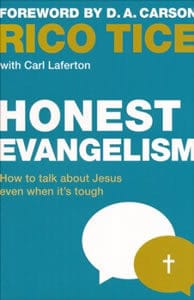Preview:
Rico Tice: We’re in a culture where people aren’t really trusting the pastors any longer. So it’s the friends they trust. So just say, “Look, do you wanna have a look at the Bible? I’m no expert, but I’ve got some questions here. We’ll let the Bible teach us, just see how it goes.”
End of Preview
John Fuller: That’s Pastor Rico Tice about sharing your faith as a Christian. Uh, he’s got a very simple and refreshing message for us today. Your host is Focus on the Family president and author Jim Daly, and I’m John Fuller.
Jim Daly: If our listeners and viewers struggle with sharing their faith, and we all do in certain ways, today’s program is going to be for you, and for me. Sometimes it’s, uh, a little uncomfortable to tell others about Jesus. Probably timing and opportunity are part of it. The person may be adversarial to the Gospel, or you may not know how to open up on this topic about Jesus, and that’s okay. We’re gonna hear more about that today with our guest, Pastor Tice. He has an inspiring message for us and a book called Honest Evangelism. And the reason he’s using that word is there’s a cost to it, yet there’s great reward in sharing the love of Christ with others. Uh, Rico is a passionate evangelist, and I’m looking forward to today’s discussion.
John: Yeah. Rico Tice is the co-founder of Christianity Explored Ministries and is the former senior minister of evangelism at All Souls Langham Place in London. He’s a regular speaker at missions and evangelistic events, and he’s developed, uh, uh, Christianity Explored courses, which introduce people to Jesus all around the world. And so his methodology has been used extensively. Let’s listen in now to Pastor Rico Tice on Focus on the Family.
Jim: Let’s start with that question about what does it mean to share the Gospel? What is the Gospel?
Rico: Well, we’re talking about Jesus, so, uh, where I always go is 2 Corinthians 4:5, “We preach Christ.” And the word preach there is herald. So at the heart of the Gospel is I’m speaking about Jesus. And I’m really looking to say three things about him. I’m talking about who he is, his identity, why he came, which is his mission, and what it means to follow him, which is his call. And I think it’s just simple and as clear as that. I’ve got to preach Christ. But who do you think he is? Why do you think he came? What does it mean to follow him? And what’s amazing, uh, Jim, is that as I speak of Jesus, this is what’s extraordinary in 2 Corinthians 4. In verse six, as I talk about him, which just seems so pathetic, God takes the power that made the world and opens people’s blind eyes and does a miracle, and gets them to see who he is.
Jim: Uh, Rico let me ask you this because that … Yes. Yes. In my soul, it’s jumping saying-
Rico: Yeah.
Jim: “Yes. Yes.” But why do we as human beings lack the courage so often to share the Gospel, to talk about Jesus, the work he’s done in, uh, our individual lives, and to just be honest and open with the person in front of us?
Rico: Well, in the book, Honest Evangelism, I talk about the pain line. And, and there is a pain line we have to cross. There’s a nervousness, and there’s a pain line because as we speak of Jesus, now, let’s not beat around the bush here. We are saying to people, “You are not an owner in God’s world. You’re a tenant. It is his world.” And that’s offensive. You know, the aroma of Christ is offensive to people who are wanting to say, “Actually, this is my life, I’ll live it,” rather than to be told, “Well, actually, each breath you get is a gift.”
Jim: Uh, yeah, let me ask you this. In England, I mean, we watch from a distance, obviously, as your cousins across the pond, (laughs) as we all like to say. But, um, you know, we’ve seen that steady decline in Europe from the US’s viewpoint, and we’ve seen Christianity so marginalized. What’s that environment like in the UK, and how difficult is it to be a Christian in the UK?
Rico: Well, first of all, I think I wanna say that it’s a decline in nominalism. I mean, these people were never really Christians. My parents, and I love them dearly, but they’re Winston Churchill Christians. That’s what they were.
Jim: What does that mean?
Rico: Well, that means that part of the culture was being Anglican. Um, Remembrance Sunday, when we remember the fallen, v-, very important thing. But almost that was the most important Sunday of the year because it was about being English. But it wasn’t primarily about following Jesus.
Jim: What, what do you think the aftermath of that nominal Christian approach has been in Europe?
Rico: Well, it means that when it gets to the tough things, as the culture becomes more anti-Christian, for example, the uniqueness of Jesus, for example, the fact that the only place for sex is within marriage, between a man and a woman, those things that the Bible says so clearly are things that, actually, the nominal people are not prepared to stand for. So churchgoing has no longer, is no longer something that’s culturally acceptable. So actually, I see it as a good time, really, because what’s happened is there’s been a purification going on. But actually, if you look at the under 35s in England, um, the 11% that are Christian are much more serious. They’re much more willing to open the Bible with their friends. So I, I’m not discouraged, actually, because there’s been a purification.
Jim: So often, people say to me, “Um, you know, I don’t have that gift of evangelism, and I’ve never led anyone to the Lord.” Uh, talk about temperament and how that might play into your ability. An introvert may find it very difficult to talk to a stranger about something, um, spiritual.
Rico: Sure. Well, uh, I think what we’ve got to see is the New Testament talks about evangelism in three different ways. So there is the evangelist whose job in Ephesians 4:10-11 is to equip God’s people for works of service. So my job at my church is to help the church family speak to their friends. There’s then the pastor, who in 2 Timothy 4, is to do the work of the evangelist. And then, thirdly, all of us to be witnesses. And by the way, the word witness has as its root the word martyr. So it’s gonna be uncomfortable. But my job, therefore, is to say to the church family, “Okay, let’s start trying to speak to our friends.” And I tend to say four things as I’m trying to get them going. Number one, celebrate people. God sovereignly has put people, Acts 17, on your street with you. He decides the times and places we all have. He gives us each breath. So they’re there with you whoever they are. Get to know them. Celebrate them. Secondly, serve them. So what’s their biggest pressure? How do I actually … You know, by asking questions, I find out about my neighbors. M-, make sure I welcome them to the street and work out what the pressures are. Thirdly, telling. That, the third area, I’m then looking to find a question that actually is I’m looking to say something Christian, having got to know a bit about them. Actually engages with the pain line. So, for example, um, there’s a guy at the end of the street who loves his plants and flowers. He’s watering them all the time.
Jim: (laughs)
Rico: And, uh, I’m just looking to say to him one day is … My son loves to go and water the plants with him. Just to say to him, “Kevin, um, where do you think … I mean, w-, I know you love flowers. Where do they come from? I mean, where are you on nature?” Now, actually, as I ask that question, I’m slightly nervous because we’re opening up, well, where are you spiritually?
Jim: Right.
Rico: But the fourth thing I tend to say to people, as I’m, as I’m designing the right question is also exiting. When, you know, in, in Matthew 10 when Jesus says, “Wipe the dust off your feet,” it means that if the guy then is hostile, that’s fine. Go back to the plants. But make sure you’ve got a question for each person that just actually could end up with hunger. It could end up with hostility. It takes a risk. You might be rejected. But what’s the question for each person that you get to know? So, for example, the flat above me, they’ve just done a huge renovation in London. It’s been going on for months. I can tell one of the guys, uh, who’s there, it’s a, a gay couple that, that are there. I can tell despite this massive renovation, he still hasn’t got any peace. So I’m gonna say to him, I’m gonna say, “Mate, you know, I, despite all this building work, I don’t think you’ve found peace yet.” So it’s just a question that opens up a chat. If they don’t wanna take it further, you know, if I hit hostility, fine. I am, in one level, risking the relationship. But I might find hunger. And what’s amazing in London at the moment is you might get hunger. You might h-, get hostility. You just don’t know until you try.
Jim: Right. Hey, let me ask you this. Not long ago, in The New York Times, uh, there was a story that I read that really caught my attention. It was about, um, people breaking down the barrier for transgenderedism. And the way they were doing it is transgendered people were going door to door, in essence, evangelizing their cause. And this was a, uh, a research study that showed that by talking to these people door to door, they had more buy-in to the position of the transgendered people. And I thought to myself, “Wow, Lord. There’s a lesson.”
Rico: Well, and Jim, I think this particularly on the street is where the doctrine of God’s sovereignty is massive. I’ve got to believe that God has put me on the street, and he’s put them on the street as well, in order that they be reached. That’s the message of Acts 17:24-28. He decides the times and places in order that they be reached. Now, once I believe that my neighbors have been put there to be reached, it gives me the confidence to start celebrating them.
Jim: Yeah.
Rico: So I think there … I mean, you know, those people who’ve got the courage to door knock, you know, when someone opens the door, let’s try and get to know them. Let’s celebrate who they are. And we’re in a culture that’s increasingly individualistic. So the guy next door to me, he’s 82, and he, you know, he loves motor racing. I’m not a petrol head. I don’t really get it.
Jim: (laughs)
Rico: But, I mean-
Jim: Petrol.
Rico: … I’m beginning to find out about it now because Michael’s into it. Now, that’s what you do. Just have a doctrine of creation that means you celebrate them. Find out what their pressures are. And actually, people really appreciate that.
Jim: Now, i-, in this country, and I think it sounds like in Europe as well, and in the UK specifically, there seems to be a greater polarization a-, at every level.
Rico: Yeah.
Jim: It’s social, economic. It’s political. It’s, uh, neighborhood to neighborhood. Uh, people are divided in this country, and it kind of creates a barrier, even for the Christian community, to be willing and courageous enough to break through that, to talk to people. It’s like, “You know what? My life is busy. My day is busy. I’m raising my kids. I don’t got time to engage people at a barbecue.” Or, you know, “Really?”
Rico: Well, uh, and brother, you know, I think that goes back to our prayer life. I mean, I really do think that. I mean, John, I worked at All Souls with John Stott for 17 years, and he got up at 10 to 5:00 each morning and slept for half an hour each afternoon. I adopted one of those two habits myself, but-
Jim: (laughs)
Rico: … but, you know, he was somebody who prayed for the people around him. And I think if we’re praying, then that does something to our heart. The Lord opens up a door. But I pray that I’ll have a real love for these people, that I’ll-
Jim: Right.
Rico: … be wanting to celebrate them. And I think, therefore, God’s sovereign. He’s put you at the barbecue next to this person. Find out about them. Ask questions. And you know, as you do that, just ask the Lord. Say, “Lord, you know, is there a question I can ask that just sees where they are spiritually?”
Jim: Yeah. So often, Rico, we turn it into a competition, though. Um, w-, we can be offended if a person isn’t willing to be open to the discussion. So we find the hook, but then we get irritated with the rebuttal. And h-, how do you calm yourself and not let your emotions, your humanness, kinda take over the moment and let the Lord k-, flow through you-
Rico: Well, that-
Jim: … so you-
Rico: Jim, that’s a great question, and it’s so fundamental because we are promised there’s going to be rejection. Our Lord Jesus was rejected. “We’re aliens and strangers in the world,” 1 Peter 1. So therefore, the key issue is this: Is my identity in the grace of God? In other words, whether you accept or reject me does not make me more valuable. What makes me valuable is Christ died for me. Now, as Tim Keller says, “You know, it’s like those old-fashioned Coke machines.” You, you can get in at the top, but you’ve got to knock it to get it down into your heart.
Jim: (laughs)
Rico: You know, because you feel the, the money going down. Well, do I really believe that my identity is in Christ? So, you know, as I wake up each morning, how does God feel about me? He’s delighted with me. Why is he delighted with me? He’s delighted with me because he’s delighted with Jesus, and I relate to God through Christ performance, not my own. Now, when I start really believing that, whatever reaction I get, I’m secure.
Jim: Right. You’re calm.
Rico: Yeah. I’m calm. And I know-
Jim: You don’t have to take it personally.
Rico: And I know I’m loved. I mean, Victor Hugo said, “Life’s greatest, uh, joy is to know that you’re loved.”
Jim: L-, let me put this to the test. Family members can be the most difficult people to talk to-
Rico: Oh, yeah.
Jim: … about the Lord. And you have a story about that in, in your own family. Um, how-
Rico: Yeah.
Jim: … how does that work within the close quarters of people who know you well?
Rico: Well, brother, y-, obviously, it’s a, mine’s a story of failure. I mean, I, I, what put me into the ministry was watching my grandmother die in 1988, and she died absolutely persuaded, as so many English are, that because she was a good person, God would accept her, so there was no need of Christ. And as I was with my grandmother as she died, I didn’t speak to her about the Lord Jesus, and the reason I didn’t was I, I feared more what my parents would think of me, and my family would think. And so as I reflected on that, I loved myself more than her, and that’s why I didn’t speak with her. What’s interesting is she was such a doting grandmother, she wouldn’t have minded what I said, I think.
John: Huh.
Rico: But I, I didn’t speak to her because my identity wasn’t secure, and because I had this idol, this idol of wanting to be accepted, wanting to be respected in my family.
John: Rico, what, uh, what you’re saying is so, um, applicable to so many of our listeners. And I’m just gonna encourage you as the listener to, uh, to get Rico Tice’s book, Honest Evangelism. Uh, we’ve got that here at Focus on the Family. Uh, stop by the website, or call 800-A-FAMILY and we’ll tell you more. And if you’re excited about what Rico is, is talking about, how to share your faith, um, even with family members, uh, who might be resistant, uh, then help us with this broadcast and our efforts here at Focus, and, uh, contribute today. And when you do, we’ll send that book to you as our way of saying thank you. And Rico, I think you’re on to something there that, uh, I just realized as you’re speaking, and that is that, uh, I feel sometimes a pressure to win the opportunity to talk about Jesus with people. And sometimes those around me who know me best, I feel like I’ve made so many mistakes.
Rico: Yeah.
John: And there’s no way I can get over that hurdle. What’s, what’s the starting point for that?
Rico: Well, brother, we’ve got to remember the qualification for being Christian is not are you good enough, but are you bad enough? You know, it’s amazing when we run Christianity Explored, which is basically just this journey through Mark’s Gospel. We just let the Gospel tell the Gospel. You ask any question you like. But week three tends to be the crunch week, and I begin by saying, “Jesus in Mark 2, verse 17, said, ‘I didn’t come to call the righteous, but sinners.’ In other words, the qualification for being here is not are you good enough, but are you bad enough?” I became a Christian ’cause I’m a bad man, and I needed forgiveness. So therefore, in my family, I just think the issue is to be honest about it. “You know, I’m working on this, and I’m sorry about that. I, I admit these things. So, uh, and the reason I come to Jesus is I need help.” And I think it’s very disarming when there’s that honesty, and we mustn’t be too presented. And I think with anybody, that level of honesty is disarming. And can I say again? It begins at the start of the day as I look at the Bible, as I see my wrongdoing, as I say, “Lord Jesus, I’m so sorry as I, I see my sin afresh. The Bible’s like a mirror. Uh, I’m sorry.” There’s that moment of like the prodigal, coming back to him when I say, “Lord, forgive me.” There’s that moment of being embraced. It’s the most glorious moment in Christian faith as I ask for forgiveness. Then I repent, and I try to get going again. Well, I think we’ve got to bring that not just vertically, but horizontally. So when we’re getting stuff wrong, we say, “Look, hands up. I’m sorry.”
Jim: Eh, Rico, um, you talked about talking to the family. Um, my wife, Jean, she’s the only Christian in her family.
Rico: Gosh.
Jim: Uh, there’s, uh, four other siblings, and her mom passed away not long ago. And, uh, she did something even back with her mom and dad when, uh, they were both alive. Called a family conference. And my wife’s a biochemist by training, so she’s very (laughs) scientific. So she called the family meeting and went out to California and sat everybody down in the living room and went through a very detailed explanation of the Gospel and talked about the Lord. She had one brother put his hand up and say, “Jeannie, I love you, but I’m an atheist. I don’t believe any of this.” Um, that’s the pain line you’re talking about, right?
Rico: Mm-hmm.
Jim: Define that pain line, uh, that you mentioned a while ago when you put yourself out there, and you get virtually no response back, at least what you could see.
Rico: Well, that’s right. And what must happen is when we … I mean, I find with new Christians, they’ve just come to faith. They bounce up to their family, and then they get a knock back like that. And they think they’ve done something wrong. And they really haven’t. They’ve just given people the opportunity to hear. And what I find in England is that people get knocked back. They hit the pain line a couple of times, and then they say, “Evangelism is not for me.” Because it’s-
Jim: I, I can’t do it.
Rico: Because it’s painful. I can’t do it because I’m too nervous, or, or this feels uncomfortable. And I-
Jim: What should that person do when they hear that in their heart? What’s the next step they should take?
Rico: Well, brother, sister, you’ve got to keep going. I mean, you know, we’ve got to say, “Lord, I believe in the Holy Spirit. Help me to love these people, but I’m gonna s-, keep speaking.” Now, it’s very interesting in, in Acts Chapter 18. I think almost the key verses in Acts are verses nine and 10, where, um, Paul is told by the Lord in a vision, “Keep speaking. I’m with you.” He’s sovereign. He’s in control. So y-, your wife is going on speaking. God bless her. If a brother puts his hand up and says that, but I’d also say, “You know, she’s had a go. Wipe the dust off your feet at one level.” So come out of it. Don’t think you’ve got to keep going. If someone said, “Look, I’m an atheist. I don’t want anymore.” Well, fine. She’s giving him the opportunity. But don’t stop crossing the pain line and saying to people, “Do you celebrate Christmas? Would you come and do that with me?” I mean, in England, that’s still culturally acceptable to ask anyone to come and celebrate Christmas. So I’m keeping saying to people, “Do that.” The big issue we’ve got, because Christianity’s less acceptable, is trying to train the churches to say, “Look, would you like to look at the Bible with me?” So just confidentially, individually, we’ll just look together. We’ll just be Bible sharers. Let me just open the Bible. We’ll, we’ll just look at a passage. I’ll ask some questions. I’m not the teacher. The Bible’s the teacher. But let’s have a look. Now, if you can get to that, where, again, it’s a big pain line to say, “Do you wanna have a look at the Bible?” But they can just say yes or no.
Jim: Right. You’re not gonna … You’ll still hopefully be breathing after that question. (laughs)
Rico: Yeah. Although I’ve got to tell you, the first time it happened with me, I mean, so I’m, I’m at rugby training at … I’m 20 years old. I’ve come from a tobacco family. I’m not from a Christian home. It’s my second year at college, and, um, I’m literally lining up for a drill at rugby training, and this guy called Andy Roberts, a-, a-, who’s right next to me, says, “I’ve had a terrible summer.” I said, “Oh, Andy.” He said, “Yeah.” He said, “My brother was killed in a farming accident.” I said, “Mate?” He said, “Yeah.” H-, he said, “My brother was a Christian.” I said, “Your brother was a Christian?” He said, “Yeah.” He said, “It’s made me think.” I said … And it just came out before I knew it. And I said, “Well, do you wanna look at the Bible with me?” And he went, “Yeah. Okay.” So I didn’t know what I was gonna do, but someone had told me Isaiah 53 was good. Did you know that?
Jim: (laughs)
Rico: Apparently, it’s good. So I got my four questions. I went round to his flat in Redland, in Bristol, in England, and I knocked on the door and went to him. And I started reading Isaiah 53 with my questions. And I started sweating. I was so nervous I was sweating. He said, “Rico, you’re sweating all over the Bible.” I said, “No, I’m fine. I’m fine.”
Jim: (laughs) ‘Cause you hadn’t done this before.
Rico: Never done it before.
Jim: (laughs)
Rico: I ask him the four questions. He’s a typical ruggerhead. He goes, “Yeah. Nope. Nope. Yeah.” So we’re finished in two minutes. Then I say a little prayer. And then I said, “Do you wanna do it again?” He said, “Yeah.” He said, “Are you gonna sweat so much next time?” Now-
Jim: (laughs)
Rico: … actually, I’m just saying, when you start, it’s scary. But Andy and I were friends, and I, I was the only guy I think he knew who was Christian. Now, can I say we’re in a culture where people aren’t really trusting the pastors any longer? So it’s the friends they trust. So just say, “Look, do you wanna have a look at the Bible? I’m not expert, but I’ve got some questions here. We’ll let the Bible teach us, just see how it goes.”
Jim: Let me ask you this. When you get the question that you can’t answer, so many times Christians will attempt to answer the question, and they fumble-
Rico: Yeah. Great question.
Jim: … and maybe give the wrong answer. What should you do when you really don’t know the answer?
Rico: Oh, brother, tell them you don’t know. So I always say, “The cults have all the answers.” You know, they’ve drilled people. They’ve got all the answers. If I don’t know, I say, “Well, that’s a great question. I don’t know. I’ll come back to you.” But that’s what I love about the Christian Explored course, that, you know, we’re on a journey together. We’ll say, “Look, come to it next week, and I’ll try and find something for you.”
Jim: Yeah. Just answer honestly.
Rico: Yeah. And we begin the course with the question, “You know, if God was here and you could ask him any question, what would it be?” So we start with, “Look, what are your questions? We wanna listen.” And, of course, people come up with stuff. And you’re going, “Why, dear friend, I’ve got no idea what to say to that. That’s desperate suffering.” But we’re then on a journey looking at Jesus and looking at Jesus in Mark’s Gospel, but at the same time, trying to bring their experience to bear a-, as we look at the creator of the world.
Jim: I, and I think, um, it’s one of the core things here at Focus on the Family. Of course, we’re dealing with marriages and difficulty in marriages. We’re dealing with parents who are struggling with prodigal children, all of those things that are normal life issues. But at the core of Focus’s heartbeat is reaching people for Christ. And, uh, last year alone, we had, uh, over 210,000 people come to Christ, or rededicate their life to the Lord, um, through the radio and through other efforts here at Focus on the Family. That’s probably … Eh, it is the most significant number that I track here at Focus, is are we doing the fundamental job of turning people towards the Lord so they can start that relationship with him, um, find salvation in him, and begin to sort out the difficulties that they’re having in their life? Uh, it’s a pretty good thing to do, isn’t it?
Rico: Well, I thank God for you, brother, and thank you again for the help you’ve been in Britain to get things started as well with the family work we’re doing there. Just to say on that, yeah, absolutely. I mean, I think Colossians 3, verse 13, is a massive verse. “Bear with one another. Forgive whatever grievances you have against each other.” Wow. How am I to do that? Forgive as the Lord forgave you.
Jim: Yeah.
Rico: So the mechanism of reconciliation is the cross. And I always say to people, “There are two phrases in family life, in married life, that are absolutely crucial.” And they are, “I’m sorry, I was wrong,” and “That’s okay, I forgive you.” And that brings in the cycle of forgiveness, and the cross is what enables me to do that. I look at what I’ve been forgiven by God, and then I can forgive others, and I can ask for forgiveness.
Jim: You know, Rico, it sounds like you are a broken, humble person, that you recognize you’re a sinner saved by grace. How did that happen? Um, you mentioned your first time explaining to your friend about the Gospel, but how did that happen for you? Who reached out to you?
Rico: Well, well, interestingly, it was the death of a loved one. So on the 6th of August 1982, I wasn’t from a Christian home. I was at an English boarding school, and my godfather was killed in a cliff fall. And-
Jim: A cliff fall?
Rico: A cliff fall. Yeah. He, he’d emigrated to Canada. He had a little boat. He mortared a small island, went for a walk. There was a tree that had fallen across a cliff path. He tried to climb over the tree, slipped and fell off the cliff and fell to his death. That was the first time I saw my father weep. And I realized no one in my family had any answer to his death. And a math teacher said to me, “When Christ rose from the dead, he rose to get you through death.” And I remember thinking, “If that’s true, it’s-
Jim: Huh.
Rico: “… the most important thing in the world.”
Jim: Yeah.
Rico: Then, at the same time, interestingly, I thought I was such a great guy, I owed it to the world to record my life. So I’d kept this diary night after night. And I found out I was a total idiot. So that was an amazing experience, too. You know, I’d write in the diary, “Wouldn’t it be wonderful if there was world peace?” Yet I’d never lay aside the weapons of malice and sarcasm I used in my own self-defense. I’d write in the diary, “You know, wouldn’t it be great if the starving were fed,” but I’d ask my parents for a larger allowance and eat it. And, you know-
Jim: (laughs)
Rico: … I just saw in myself, there was this massive gap between the real and the ideal. Years later, I, I read in Romans. Paul writes, “I don’t do the good I want to do. You know, the evil I don’t wanna do, that’s what I keep on doing.” And, and, again, this math teacher then said in, as I kept that diary and I spoke to him, he said, “Look, when Christ died on the cross, he died that you could be forgiven.” And I’ve never really moved from those two experiences. Jesus died on Good Friday so I could be forgiven my guilt. And he rose on Easter Day so I could have hope in the face of death. And for me, the next 30 years have been about telling people that. And, and the Lord Jesus is the one who can do this. But then, as he dies on Good Friday, he dies so we can forgive each other. So can I say again, for family life, I’m sorry I was wrong. That’s okay. I forgive you. Or that’s okay. I love you. Those phrases, that is the cycle that keeps intimacy, because if you’re not saying that, what happens is sin puts the Great Wall of China up between you. So people at my church, single people, they come to me, and they say, “I’m lonely.” And I say, “No, you’re not.” They say, “No, I’m lonely.” I say, “No, no. The people in bad marriages are really lonely.” And the heart of that is we’re not forgiving each other. So I look at Jesus, and I have grievances. Colossians 3:13. “But forgive whatever grievances. Forgive as the Lord forgave you.” So that is the heart of what keeps me forgiving. And it keeps the intimacy both with the Lord and with my wife and family.
Jim: Well, and it keeps you in a humble place, which is a good place. Uh, Rico Tice, author of the book, Honest Evangelism, what a great example, and what, um, great stories are in this book to help us be more courageous about sharing our faith and telling people the good news of the Gospel of Jesus Christ. Thanks for being with us.
Rico: It’s been an absolute joy to join you here, and I am looking forward to walking in the Colorado hills this afternoon.
Jim: (laughs) Those are mountains.
Rico: Mountains.
Jim: (laughs)
Rico: Sorry. Yeah. The mountains. How dare I?
Jim: Yeah. Good to, good to have you. We’re-
John: Yeah. Yeah. Well, what a great conversation with Rico Tice on Focus on the Family. Uh, he is a wonderful guest, and I hope you’ll download the program and listen to it with your family or share it with your small group. Uh, this is the kind of approach we need to have with our friends and our neighbors as we share the good news. Again, the title of Rico’s book is Honest Evangelism: How To Talk About Jesus Even When It’s Tough. It’s 100 pages of exciting reading about evangelism that should give you a jumpstart to be a little more bold in sharing your faith. Get a copy of Honest Evangelism when you call 800, the letter A, and the word FAMILY. 800-232-6459. Or stop by focusonthefamily.com/broadcast. And when you contribute generously to the work of Focus on the Family to help us share the Gospel around the world, we’ll send you a copy of Rico’s book as a thank you gift. And this quick note as we close. Um, I’m gonna encourage you to listen to Jim’s brand new podcast. It’s call ReFOCUS with Jim Daly. As you look for ways to engage the culture around you, uh, your own sphere with grace and truth and love, ReFOCUS with Jim Daly will help you do just that. You can hear Jim’s latest episode with Joe Dallas. He once identified as a homosexual and actively promoted a pro-gay theology. And Joe has a really powerful story of how God gently guided him back to biblical truth through a process of, uh, repentance and restoration. I think you’ll find it really powerful. You’ll find that at refocuswithjimdaly.com. Next time we’ll hear from Mark and Jill Savage as they share about a difficult season in their marriage and how God moved in.
Preview:
Jill Savage: And he came and found me that morning and said, “I want you to know that I’m filing for divorce this week.” In fact, he, he had a, a piece of paper, and he had a line drawn down the middle, and he said, “So this is our world. This is my yard. This is your yard. And this is the fence. And we’ve been meeting at the fence. But I don’t wanna meet at the fence anymore. So I’m filing for divorce this week.”
John: On behalf of Jim Daly and the entire team, thanks for listening to Focus on the Family. I’m John Fuller inviting you back as we once again help you and your family thrive in Christ.
End of Preview



















